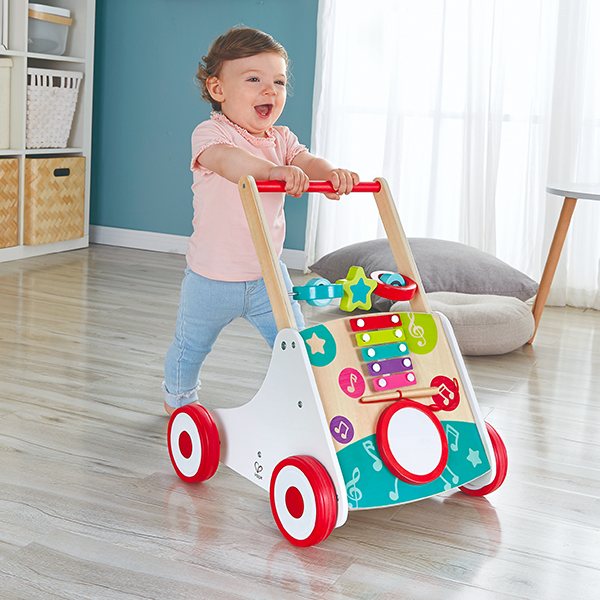27 June 2024
4 min.
Walking is a crucial part of your child's development, marking the transition from infancy to toddlerhood. It not only promotes physical strength and coordination but also enhances cognitive skills as your baby explores their environment and learns about spatial relationships. The journey to walking builds a foundation for future physical activities and is an essential step in your child's overall growth.
Confidence plays a vital role in learning to walk. Babies need to feel secure and supported as they embark on this new adventure. Let's dive into our top three strategies to get your baby walking with ease!

Creating a Safe Environment
Ensuring your baby has a safe environment to practice walking is the first step to building their confidence. Here’s how to create a space to support those crucial first steps.
You can clear the area of any potential hazards that could trip or distract your baby. Remove small toys, rugs, and any furniture with sharp edges. Be sure to place soft, non-slip mats or carpets in the walking area to cushion any falls and provide a stable surface.
Encouragement and Praise
Positive reinforcement is a powerful motivator for babies learning to walk. When babies feel supported and cheered on, they are more likely to keep trying and improving their walking skills. Use enthusiastic and supportive language such as “Great job!”, “You’re doing amazing!”, or “Look at you go!”. Combine these phrases with clapping, smiling, and open arms to create a welcoming and encouraging atmosphere.
Push Toys
Push toys are excellent aids for encouraging babies to take their first steps. They offer essential support, helping babies keep their balance as they take their first steps, plus engaging features, such as sounds, lights, and movement, motivate babies to move and explore.
By incorporating push toys into your baby’s routine, you provide them with various fun and effective ways to practice walking. Creating obstacle courses and interactive games can also help develop their physical abilities whilst making the learning process enjoyable and engaging. We’ve picked out some of our favourite Push & Pull toys for you to explore:

Walks in the Park or Favourite Destinations
Incorporating walking into your baby’s daily routine can help them practice and improve their walking skills naturally. Taking regular strolls in the park offers a safe and spacious environment where your baby can practice walking on different surfaces, like grass and pavement, helping them adapt to various walking conditions.
Simply by holding your baby’s hand and letting them explore the park at their own pace provides the support they need while giving them the freedom to look around, touch different textures, and enjoy the sights and sounds of nature.
Walking to nearby places instead of always using a stroller can be exciting adventures for your baby, filled with new experiences and opportunities to practice walking. You can even turn these walks into fun and engaging activities. Point out interesting things along the way, like birds, or flowers. Sing songs, play simple games like “I Spy,” and celebrate every small milestone to keep your baby motivated and happy.

Building confidence in early walkers is crucial for their physical development and overall growth. By creating a safe environment, offering encouragement and praise, and incorporating engaging activities like push toys and obstacle courses, you can support your baby’s journey to taking their first steps.
We encourage you to try the activities and using Hape push toys can make walking practice fun and effective. These tools and techniques will not only help your baby gain confidence but also turn their walking practice into an enjoyable adventure.
Don’t forget to share your child’s walking journey with us on social media and tag us @hape_uk.